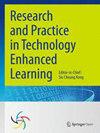孤独、学术自我效能感和在线学习环境中的学生参与:幽默在学习中的作用
IF 3
Q1 EDUCATION & EDUCATIONAL RESEARCH
Research and Practice in Technology Enhanced Learning
Pub Date : 2023-04-16
DOI:10.58459/rptel.2024.19002
引用次数: 2
摘要
本研究旨在探讨新冠肺炎大流行背景下远程教学中孤独感对学业自我效能感和学生参与度的影响。此外,作为一个边界条件,我们研究了中间ASE在孤独、学生投入和学习中感知幽默之间的关系中的作用。来自印尼六所大学的367名本科生完成了一份在线调查问卷。使用Macro Process version 4对数据进行分析,以检验调节中介模型假设。正如预期的那样,研究结果表明孤独感与ASE和学生投入呈负相关。ASE被证明对学生的参与有积极的影响;同时,它在孤独感与学生参与度之间起着中介作用。最后,在测试模型中,幽默对学习有显著的调节作用。本研究通过揭示ASE在孤独感与学生敬业度之间的中介作用,对现有文献的研究做出了贡献。基于社会认知理论(SCT)和教学幽默加工理论(IHTP),我们探讨了学习中的幽默感知如何调节孤独感、ASE和学生参与之间的关系。本文章由计算机程序翻译,如有差异,请以英文原文为准。
Loneliness, academic self-efficacy, and student engagement in the online learning environment: the role of humor in learning
This study investigated the impact of loneliness on academic self-efficacy (ASE) and student engagement in the context of remote teaching during the COVID-19 pandemic. Moreover, as a boundary condition, we examined the role of intermediate ASE in the relationship between loneliness, student engagement, and perceived humor in learning. A total of 367 undergraduate students from six universities in Indonesia completed an online questionnaire. Data were analyzed using Macro Process version 4 to test the moderating mediation model hypothesis. As expected, the study results show that loneliness is negatively related to ASE and student engagement. ASE is proven to affect student engagement positively; concurrently, it plays an intermediate role in the link between loneliness and student engagement. Finally, humor had a significant moderating effect on learning in the tested model. This study contributes to the existing literature on loneliness and student engagement by uncovering the intermediate role of ASE. Drawing on the social cognitive theory (SCT) and instructional humor processing theory (IHTP), we explored how perceived humor in learning moderates the relationships between loneliness, ASE, and student engagement.
求助全文
通过发布文献求助,成功后即可免费获取论文全文。
去求助
来源期刊

Research and Practice in Technology Enhanced Learning
Social Sciences-Education
CiteScore
7.10
自引率
3.10%
发文量
28
审稿时长
13 weeks
 求助内容:
求助内容: 应助结果提醒方式:
应助结果提醒方式:


